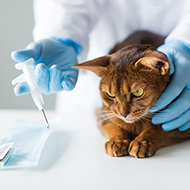Cat microchipping to become compulsory

Owners found not to have microchipped their cat will be given 21 days to get one implanted.
Microchipping of pet cats will become mandatory under new rules announced by the Government today (4 December).
Under the plans, owners will be required to microchip their cats by the time they reach 20 weeks of age and their contact details stored and kept up to date in a pet microchipping database.
Owners found not to have microchipped their cat will be given 21 days to get one implanted or could face a fine of up to £500.
The rules follow a Government call for evidence and consultation on the issue in which 99 per cent of respondents expressed support for the measure.
Animal welfare minister Lord Goldsmith said: “Cats are much-loved parts of our families and making sure that they’re microchipped is the best possible way of making sure that you are reunited with them if they are ever lost or stolen.
“These new rules will help protect millions of cats across the country and will be brought in alongside a range of other protections we are introducing under our Action Plan for Animal Welfare.”
Cats Protection’s head of advocacy & government relations Jacqui Cuff said: “As the UK’s leading cat charity, we have been at the forefront of the campaign for compulsory microchipping of pet cats. Every day, we see how important microchipping is for cats and for the people who love them – whether it’s reuniting a lost cat with their owner, identifying an injured cat, or helping to ensure an owner can be informed in the sad event that their cat has been hit and killed by a car.
“Microchipping is by far the most effective and quickest way of identifying lost cats and can help ease the pressure on rescue charities like Cats Protection. Without a microchip, a lost cat will most likely end up being rehomed to a new home as there is often no trace of their original owner.”
The Government has been working with the RCVS to introduce new guidance which requires vets to scan the microchips of healthy dogs to help ensure they are not put down unnecessarily. It is also conducting a review of the regulations on dog microchipping and the related microchipping database systems to consider whether improvements can be made.
The new cat microchipping rules will come into force when this review concludes to ensure that any changes to the operation of the microchipping regime are brought in at the same time as the new microchipping rules for cats.



 The Veterinary Medicines Directorate (VMD) is inviting applications from veterinary students to attend a one-week extramural studies (EMS) placement in July 2026.
The Veterinary Medicines Directorate (VMD) is inviting applications from veterinary students to attend a one-week extramural studies (EMS) placement in July 2026.